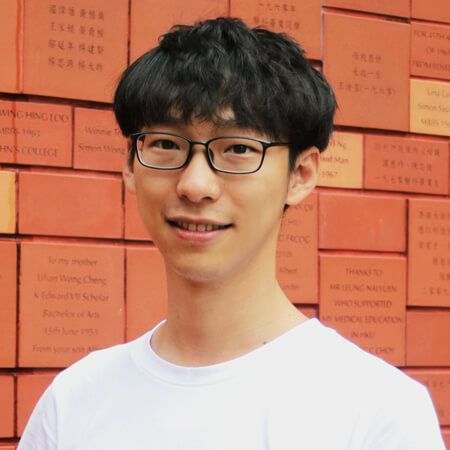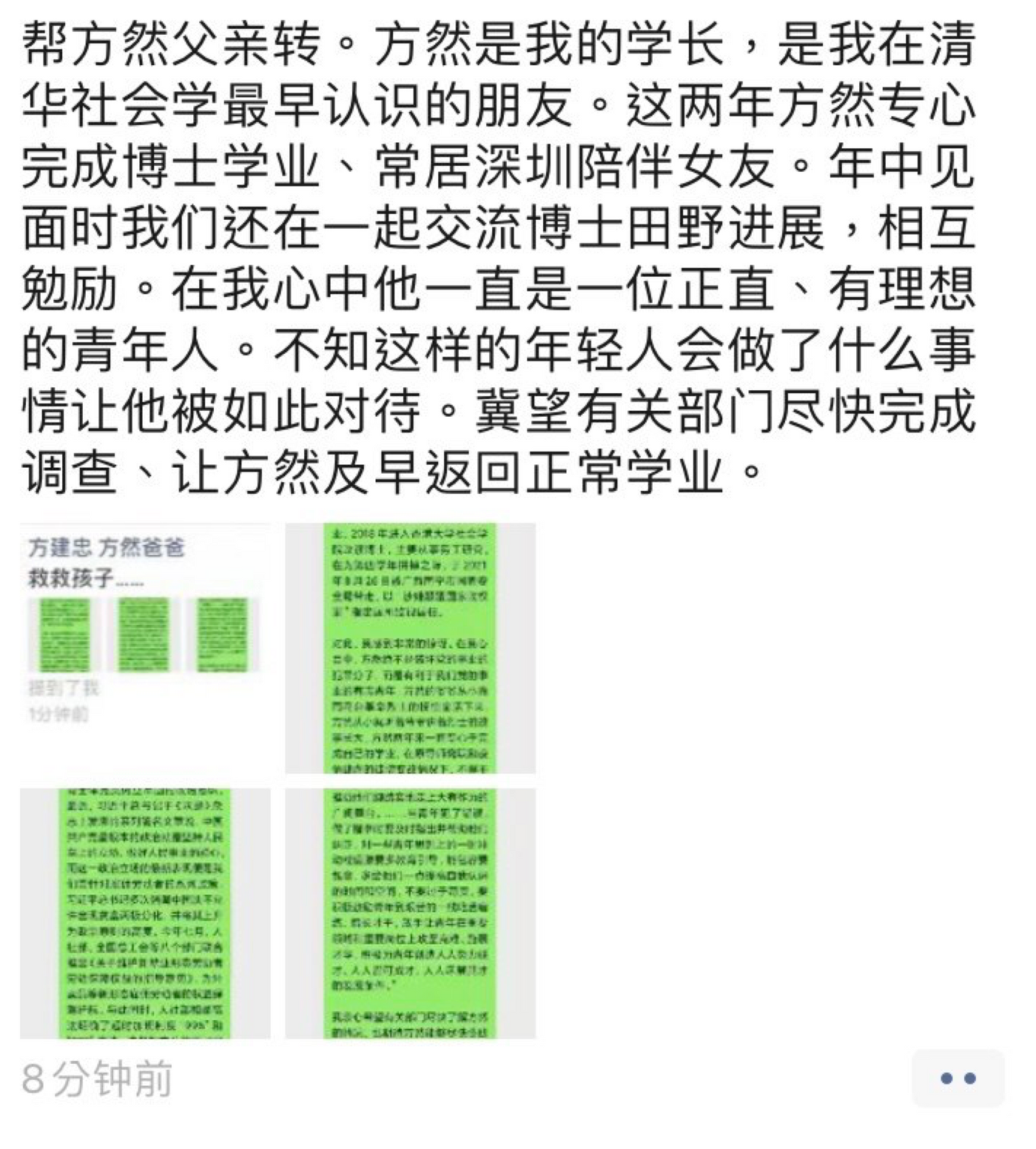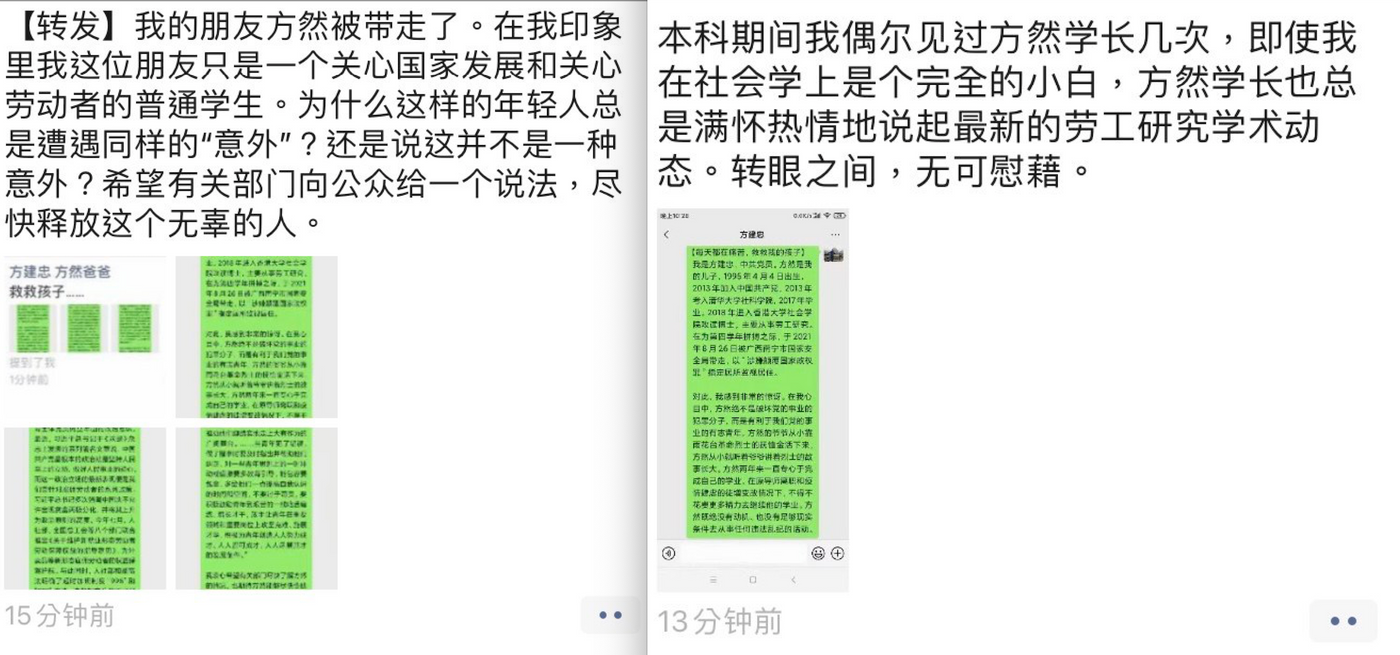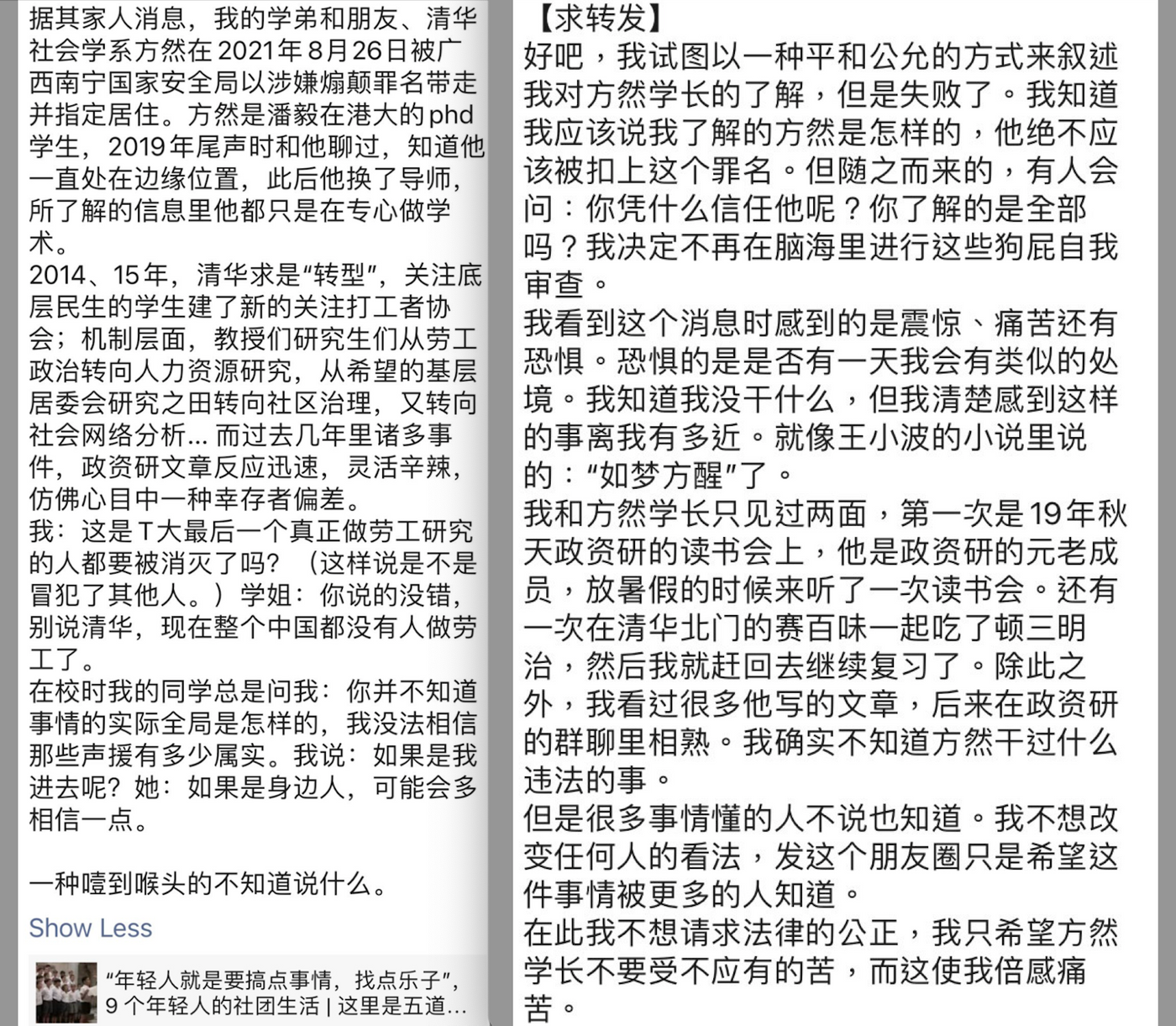N News | Hong Kong University labor researcher Fang Ran is "suspected of subverting the state power", and his friends say "he is just a student who is passionate about labor research"

Fang Ran has been doing labor research for seven years, from undergraduate studies at Tsinghua University to doctoral studies at the University of Hong Kong. He was still continuing his doctoral research until he was taken away by the National Security Bureau of Nanning City, Guangxi on August 26 this year. The 26-year-old traveled to factories across the country all year round to do field research, lived and ate with workers, and helped workers with pneumoconiosis to defend their rights, as he said, "combining theory with practice."
However, his enthusiasm and dedication to research were considered by the authorities to be "suspected of subverting the state power."
Several of Fang Ran’s friends confirmed to NGOCN that on August 26, Fang Ran was placed under residential surveillance at a designated location by Nanning police on suspicion of “subversion of state power” and has been out of contact since then.
Fang Ran's friend Wu Ying (pseudonym) told NGOCN that Fang Ran's hometown is Nanning. The local police seized his mobile phone and computer at the end of June and called him to pick them up at the end of August. When he returned to his hometown, he was taken away by the police. Wu Ying also added that Fang Ran had been harassed by the Nanning police for a long time. He thought he was just being interviewed as usual this time and did not make any preparations. He did not expect to be directly placed under residential surveillance at a designated location.
"I'm very sad now and worried about his condition in there," Wu Ying said. "Designated residential surveillance is very torturous. He has never been treated like this before. I'm worried that he is being abused physically and mentally."
Domestic legal circles call residential surveillance at a designated location a "super detention method" that "is prone to human rights violations." Lawyer Si Weijiang once wrote : In this case, you may be held in solitary confinement in a secret location for six months, and you may not see a lawyer for more than a year. Your family members don't know how you are doing. They can't even be sure that you are still alive, because there may be a long time before the trial. Not to mention the people inside, the vast majority will choose to plead guilty.
"We don't know where he is, and we don't have a lawyer. Even if we did, we wouldn't be able to see him. We can only wait for the official announcement," said Wu Ying.
Since interviewing the Nanning Public Security Bureau would have brought more danger to Fang Ran and his family, NGOCN did not contact the Nanning police. However, this state of no news has caused great distress to the family members who worry day and night. A letter for help titled " I am in pain every day, please save my child " circulated on social media. The father, Fang Jianzhong, revealed his party membership in the first sentence of the letter and said that his son Fang Ran, who is also a party member, "is by no means a criminal who undermines the party's cause, but a young man with ambitions who is beneficial to our party's cause." In the last sentence of the letter, it is specifically mentioned that "Fang Ran has neither the motive nor the sufficient realistic conditions to engage in any illegal activities."
Although Fang Jianzhong was not contacted, NGOCN verified the authenticity of the letter through multiple channels.
"He was just doing field research to understand the workers' working conditions and help them protect their rights and change the status quo. How could that be considered subverting the state power?" Wu Ying said that many friends were puzzled and angry about the "subversion" that Fang Ran was accused of.
She said that Fang Ran's doctoral thesis was about the intersection of labor and history, and he had recently visited many factories in the south to do field research. In 2018, Curiosity Daily interviewed Fang Ran, who had just graduated from Tsinghua University, and recorded his experience of the life of workers in a printing factory in Yizhuang, Beijing: he spent 15 hours a day putting anti-counterfeiting labels on "Five Years of College Entrance Examination and Three Years of Simulation" and wrapping books for "One Hundred Years of Solitude"; he also wrote about his travels to Guangdong and Hunan to visit the relief stations and homes of workers with pneumoconiosis, recording them and helping them defend their rights.
"He is a student who is passionate about labor research," Wu Ying said. "Fang Ran cares about workers and vulnerable groups, and understands the hardships of workers' lives. He is also passionate about political economics theory and hopes to help improve their lives."
In 2018, Fang Ran came to the University of Hong Kong to study under Professor Pan Yi, a senior researcher on China's labor issues. "Academia has already developed a lot of 'good things'," he told Curiosity Daily before going to Hong Kong for further studies, and he said that he wanted to combine theory with practice.
Professor Pan Yi recently learned that Fang Ran was taken away by the police. She declined an interview with NGOCN but said she was trying to find out what happened and expressed her hope to know how to help and protect Fang Ran.
A spokesperson for the University of Hong Kong responded to NGOCN’s interview by saying: “The university is aware of the relevant incident and is actively paying attention to it. We will provide appropriate assistance to Mr. Fang and his family.”
Labor movements, labor NGOs, and labor academic research flourished at the beginning of this century. Workers in Guangdong and Fujian went on strike and negotiated with employers on wages and benefits and work-related injury insurance. The 2011 strike at the Yantian International Freight Terminal even led to the establishment of an independent union under government coordination. However, around 2015, the labor movement and labor NGOs were suppressed on a large scale. The "Jasic Workers Incident" in 2018 was characterized by Xinhua News Agency as a "riot" "trained and funded by foreign organizations", and the article put double quotation marks around the word "rights protection" 17 times.
The reporter observed that after the Jasic workers' movement, the labor rights movement almost disappeared at the mainstream level, and even words such as "labor" and "rights protection" became highly sensitive words. However, the Jasic incident did not stop Fang Ran from conducting field research on labor issues. During his doctoral studies, he traveled to factories in southern provinces, working and living with workers while studying their living conditions, work injury insurance, and pneumoconiosis treatment.
Friends say that Fang Ran has a strong sense of justice and "belief", and is also persistent and childish. He cares about various social events, such as Beijing's elimination of "low-end population" and the #MeToo anti-sexual harassment movement. He always speaks out publicly online. When he encounters national teachers who promote nationalism and authoritarianism under the banner of Marxism, he will always argue with them from an academic perspective.
"If he feels that the other party is going too far, he will not sleep to make the other party explain it to him," said Wu Ying.
In real life, Fang Ran is a cheerful boy. Friends describe him as tall and thin, with curly hair and glasses. He likes to listen to "Kill That Shijiazhuang Man" by Universal Youth Hostel. He is a little socially anxious, but he is delicate and cares about other people's feelings. "I gave him a canvas bag, and he would carry it every time he saw me," Wu Ying said.
But the "big boy" Fang Ran disappeared five days ago, and his friends were worried that his body and mind would not be able to withstand the possible abuse during the period of residential surveillance at a designated location.
"His heart is full of idealistic simplicity and enthusiasm for labor rights and social welfare. I don't know what will happen inside (residential surveillance)," Wu Ying said.
In 2017, Fang Ran, who was still a student at Tsinghua University, published an article titled “War, the World System, and the Future of the Labor Movement” on the CNPolitics public account, concluding:
Intellectually, we must prepare for the worst, and willfully, we must believe that the future is bright and work hard for it. If the world can embark on a more equitable, sustainable and peaceful development path in the near future, the ongoing struggle of Chinese workers for dignity and justice will undoubtedly play a vital role in it.
The following are relevant screenshots to prove it:



(To protect the personal information of the interviewee, Wu Ying is a pseudonym)
Like my work? Don't forget to support and clap, let me know that you are with me on the road of creation. Keep this enthusiasm together!



- Author
- More